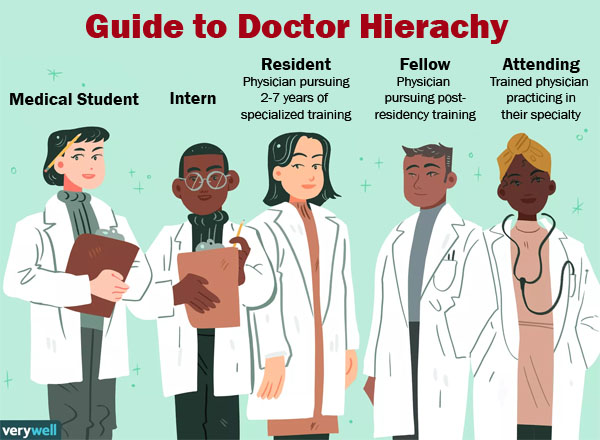LOCAL
UW’s medical trainees need fair pay, will walk out Sept. 25
Amid growing financial hardship, UW Resident and Fellow physicians plan walkouts throughout Seattle
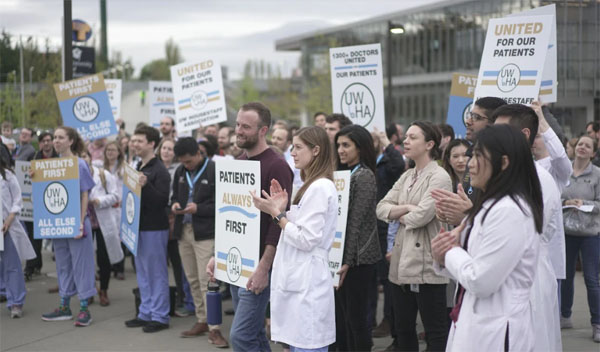
By DAVID GROVES
The Stand
SEATTLE (Sept. 20, 2019) — The University of Washington Housestaff Association (UWHA), which represents medical/dental trainees at the university’s hospital facilities, says UW Resident and Fellow physicians are paid significantly lower than those at their peer institutions. In fact, UW may have the worst-paid residency program in the country based on the area’s cost of living.
And UW is proposing to cut their pay even further.
The UWHA says its member Residents and Fellows are paid $12,000 less than their peer institutions. As the cost of Puget Sound-area housing and living continues to skyrocket, university administrators are offering measly 1%-1%-0% salary increases over a three-year contract, and freezes or cuts to various stipends.
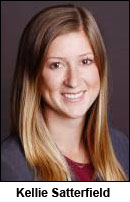 “Our medical Residents and Fellows at UW are the lowest paid residents in the county per cost of living and we have been operating under an expired contract for months,” said UWHA President Kellie Satterfield. “We make up 20 percent of doctors in King County and we proudly serve our community every day. So next week we are participating in a 15-minute Unity Walkout to show the university that it’s time they provide us with a fair contract.”
“Our medical Residents and Fellows at UW are the lowest paid residents in the county per cost of living and we have been operating under an expired contract for months,” said UWHA President Kellie Satterfield. “We make up 20 percent of doctors in King County and we proudly serve our community every day. So next week we are participating in a 15-minute Unity Walkout to show the university that it’s time they provide us with a fair contract.”
After struggling for months to get a fair deal to replace its contract that expired in June, UWHA members are conducting a Week of Action to build community support and pressure for a fair contract. And they could use the support of fellow union members.
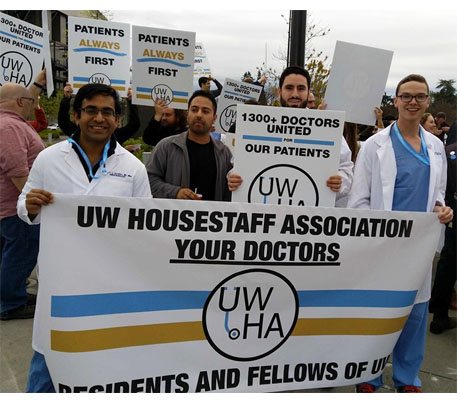 TAKE A STAND — The UWHA Week of Action is building up to a 15-minute Unity Walkout by UW Residents and Fellows on Wednesday, Sept. 25 at four Seattle locations:
TAKE A STAND — The UWHA Week of Action is building up to a 15-minute Unity Walkout by UW Residents and Fellows on Wednesday, Sept. 25 at four Seattle locations:
— UW Medical Center, 1959 NE Pacific St
— Harborview Medical Center, 325 9th Ave
— Seattle VA Medical Center, 1660 S Columbian Way
— Seattle Children’s Hospital, 4800 Sand Point Way NE
Meet them at the front entrances of these facilities from noon to 12:15 p.m. and show your solidarity. They’ll be easy to spot in their light blue shirts!
BACKGROUND — In addition to serving their communities’ healthcare needs, university-based hospitals are typically teaching facilities as well. Post-medical school training begins with one year as an Intern, who practice supervised medicine only. After finishing their Intern year and passing exams, physicians can become general practitioners. But the vast majority continue their specialized training as Resident physicians in training hospitals, typically for two to seven years. After completing their Residency, a physician may then choose to complete further training in a specialty as a Fellow.
Residents are commonly expected to work 80-hour weeks — sometimes even more. (That’s why they call them “Residents.”) On average, they have about $200,000 in student loan debt. And they often have little or no say in where they are matched for their Residency training. They willingly face these unique challenges because they are passionate about becoming doctors and medical specialists in their areas of expertise.
But when they become Residents or Fellows at the University of Washington’s Seattle-area hospitals, they aren’t making enough money to live in the community or support their families.
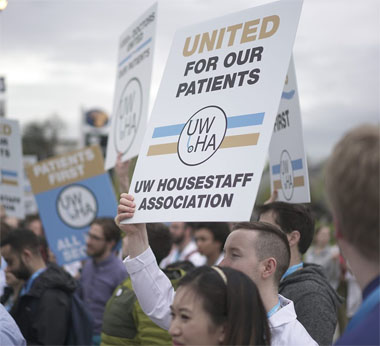 That’s one of the reasons the University of Washington Housestaff Association was founded in 1964 — so UW’s medical/dental trainees could collectively bargain for better pay and terms of employment. Over the years, the UWHA has won incremental gains. But with the Seattle tech boom and resulting dramatic increase in the cost of living in Seattle, UWHA members’ top issue has become the financial hardship of comparatively low wages and high educational debt burdens.
That’s one of the reasons the University of Washington Housestaff Association was founded in 1964 — so UW’s medical/dental trainees could collectively bargain for better pay and terms of employment. Over the years, the UWHA has won incremental gains. But with the Seattle tech boom and resulting dramatic increase in the cost of living in Seattle, UWHA members’ top issue has become the financial hardship of comparatively low wages and high educational debt burdens.
These financial concerns have prompted a new wave of resident activism and now the UWHA is taking action to improve their compensation.
In addition to showing your support at the Sept. 25 walkouts, get more information about the UWHA and stay informed about their push for a fair contract by visiting their website, following them on Facebook and/or @UW_housestaff on Twitter.

